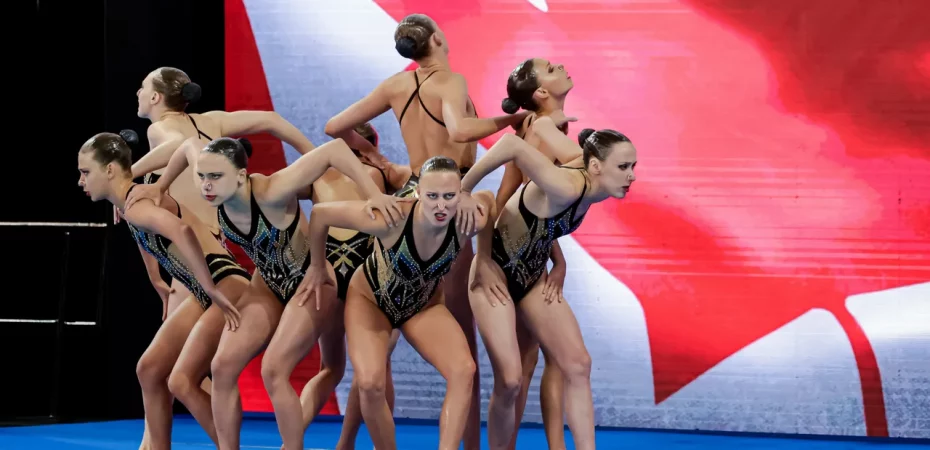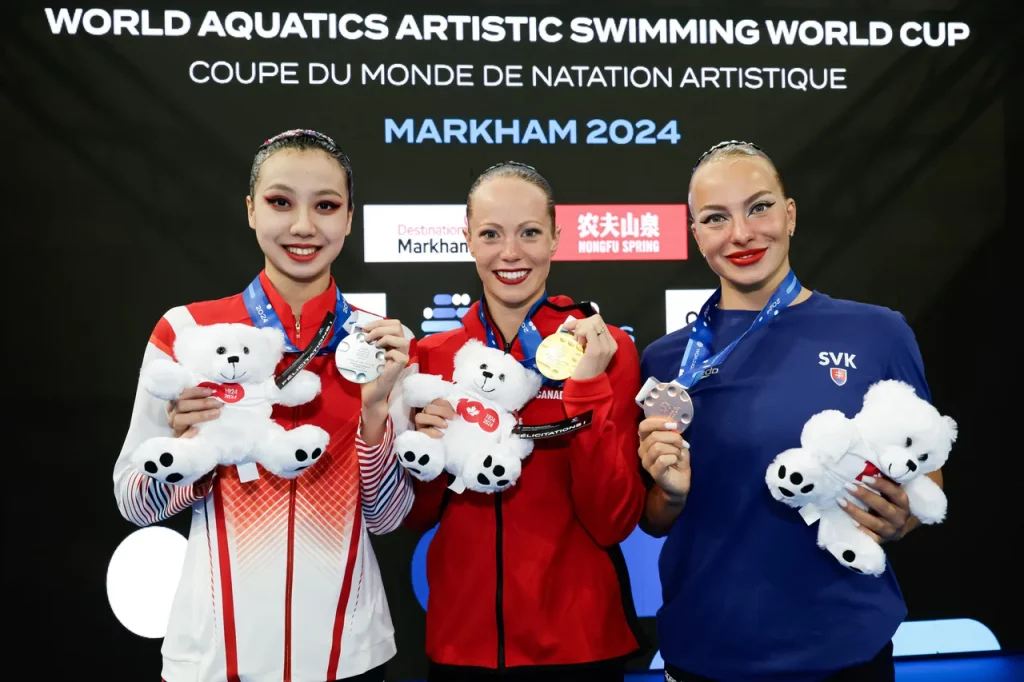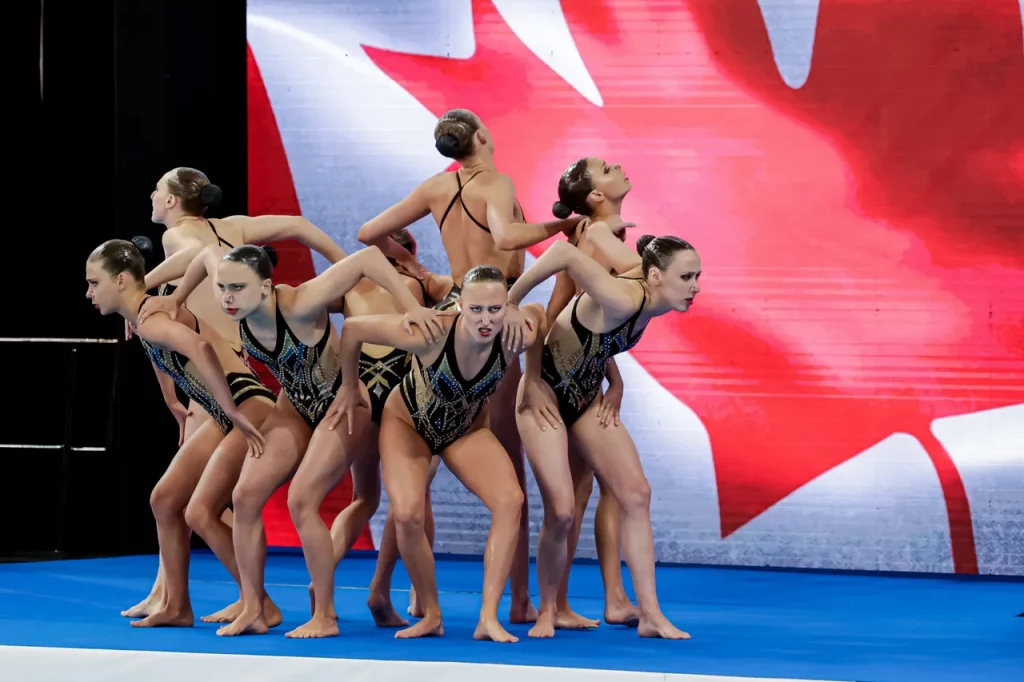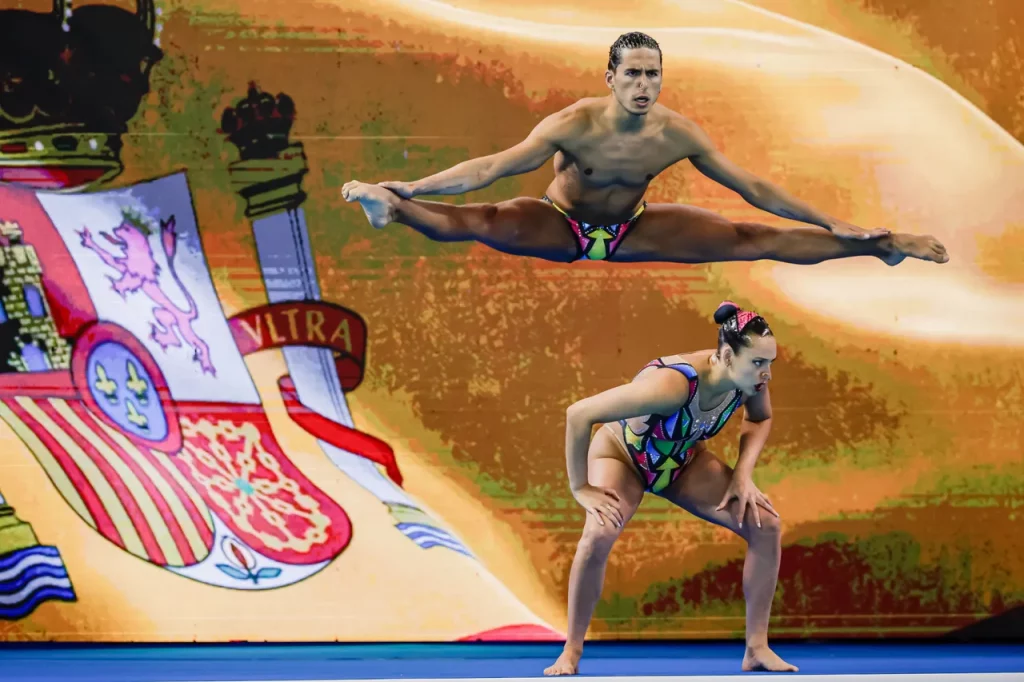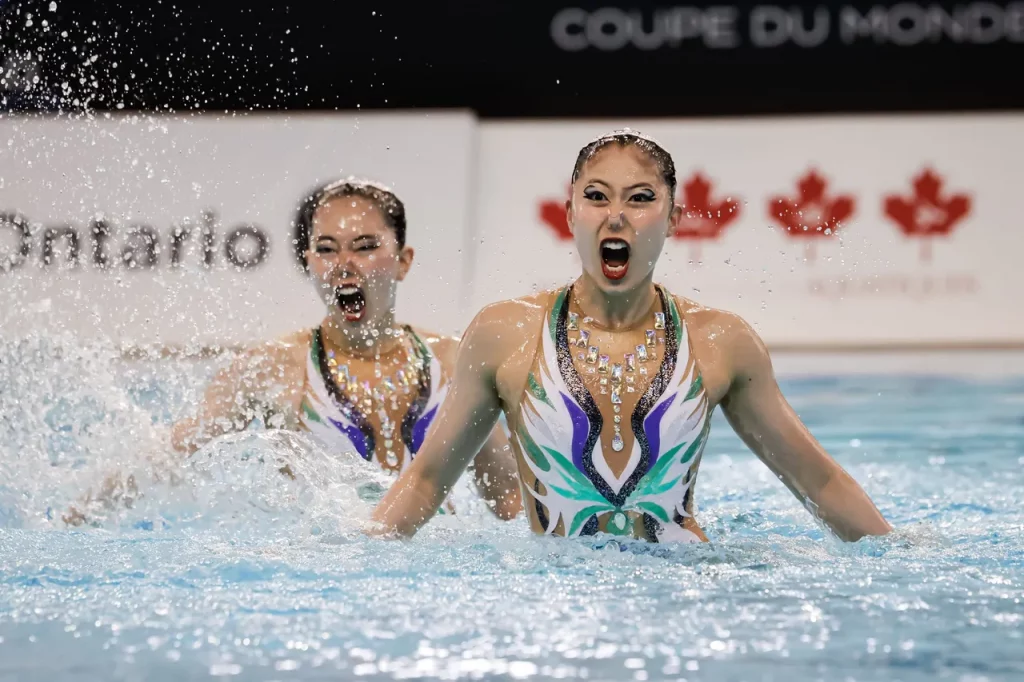Held in Markham near Toronto, the penultimate artistic swimming World Cup of the 2024 circuit saw team Canada deliver outstanding results on home soil.
Over the three days of competition, the Canadian team was greatly successful and earned a medal in all seven events it was entered in. Two-time Olympian Jacqueline Simoneau led the charge, taking home six medals, one in every event she competed in, including a gold in technical solo.
Reigning vice-World Champion in this event, Simoneau showcased a new routine in Markham, swimming to “Ainsi Bas La Vida” by Indila. The 27-year-old won five silvers in free solo, technical duet, free duet, technical team and free team. The Canadian team also earned bronze in the acrobatic event, an event in which she didn’t compete here but should join come the Olympic Games.
Overall, Canada has clearly opted to raise the bar in terms of difficulty and to see how far it can keep pushing. In Markham, the Canadians had declared the highest declared Degrees of Difficulty (DD) across all events it participated in, except in technical duet where it had the second-highest by 0.05.
Following this competition, the country boasts at this time the highest-ever credited DD in the three Olympic team events, with 46.35 in technical team, 62.10 in free team, and 25.40 in acrobatic team. It also holds the top spot in free duet with a DD of 49.25.
In the technical duet, the fight for gold came down to only 0.0217 between the Canadian duet of Simoneau and Audrey Lamothe, and the pair of Austria. After withdrawing from the event at the Paris World Cup, Anna-Maria and Eirini Alexandri of Austria finally got to perform their new routine, set to “We Will Rock You” by Queen, and with the highest DD of the competition at 37.60.
Although they received a lower artistic impression score that they perhaps would have liked, the triplet sisters ultimately won the event with a score of 248.3567 thanks to their superb execution and technique.
Overall, nine Olympic pairs competed in this World Cup to gain experience or test out new routines: Austria, Canada, Israel, Japan, Mexico, New Zealand, South Korea, Ukraine and the USA.
Japan used this opportunity to try out a new pair, with Higa Moe swimming alongside Sato Tomoka in this event for the very first time. Previously, Higa had been competing alongside Yasunaga Mashiro since 2023.
The two had won the gold medal in the technical duet at the Fukuoka World Championships, as well as silver at the Asian Games in 2023. More recently, they had earned silver at the Paris World Cup in technical duet, and placed fourth in free duet.
However, according to the national press, the Japanese staff still “decided to continue looking for the best pair to accurately execute the more difficult routine.” All three athletes have already been named to the Olympic team anyways, and Sato was originally the duet’s reserve.
This test turned out to be a successful one for the Japanese delegation, with Higa and Sato winning gold in free duet (253.7730) and bronze in technical duet (246.3600) with two basemark-less routines.
Nuria Diosdado and Joana Jimenez of Mexico also used this meet to unveil a new free duet, an event in which they hadn’t competed since the Pan American Games last November.
Swimming to a techno remix of “Vois sur ton Chemin” from the French movie “Les Choristes,” the Mexicans secured a clean routine and placed fourth with a score of 233.4356.
Ukraine made its return to the team competition for the first time since Doha, but solely focused on the acrobatic team in Markham. Since the last World Championships, the Ukrainian squad has been almost completely renewed.
Only Valeriya Tyshchenko and team flier Oleksandra Goretska returned from the silver-winning routine in Doha, while Angelina Ovchynnikova made her comeback to the senior squad as well after being sidelined at the beginning of the season. The other five athletes on this team, many of them 16 years old, made their senior international debuts in Markham.
Nevertheless, this new and young squad clearly showed it could handle the pressure. The Ukrainians showed confidence, energy and precision throughout the routine, and nailed one difficult acrobatic move after another to win gold with a score of 244.4834.
Earlier in the day, twins Maryna and Vladyslava Aleksiiva had also secured a medal for Ukraine by winning bronze in the free duet with a 242.1772 for their “Up Down” choreography.
The team of China, which was the same “B” squad as in the Beijing World Cup, claimed gold in technical team and silver in acrobatic team. World bronze medalist Xu Huiyan also secured silver in technical solo and gold in free solo.
The USA, ramping up for the Olympics much like Canada, claimed gold in the free team and bronze in technical team. The nation didn’t appear in the acrobatic team event here; head coach Andrea Fuentes stated they are preparing a new routine for the Olympic Games.
The Americans had come to Markham with the clear intention of testing a few athletes that didn’t compete in the Paris World Cup, essentially considering this as a final trial before announcing the Olympic team in a few days.
After missing the competition in Paris, Calista Liu returned to the technical team lineup, while Keana Hunter got to showcase her strengths in the free team routine. Notably missing from the entire competition was Bill May, who did not swim in any routine after appearing in all three in Paris.
Kenneth Gaudet brought a third medal to the US team, a bronze in technical solo. Finally and after trying out four different combinations last time out, the USA appears to have settled on Jaime Czarkowski and Megumi Field for the duet. In the water, the two are a great match, and Czarkowski is arguably one of the top athletes of this squad. Unfortunately, they received a few basemarks this time around in both technical and free events, and finished eighth and ninth overall, respectively.
This World Cup marked the return of Dennis Gonzalez Boneu of Spain to competition. The 20-year-old and vice-world champion in free solo had to miss the first two World Cups of the season after undergoing forearm surgery. He came back as if he almost never left, slightly upping his difficulty across his three routines.
All in all, this outing in Markham was a successful one as he returns to Spain with three medals: gold in technical and free mixed duet, and bronze in free solo. It was also the first time he and Emma Garcia swam together in the free mixed duet, as the two have previously only competed in the technical event together.
While Spain dominated the mixed duet events, both golds in the men’s solos were claimed by Kazakhstan. Eduard Kim won the technical solo with his routine set to “SOS d’un terrien en détresse”, while Viktor Druzin won the free solo, boosted by a massive 38.10 DD. The country also claimed silver in technical mixed duet, and bronze in free mixed duet and free team.
Filippo Pelati of Italy leaves Markham with four medals won across both men’s solo and mixed duet events. The 17-year-old, reigning World Youth Champion in solo and European Junior Champion in free solo, was also recently called up for the European Championships in Belgrade.
Finally, Viktoria Reichova of Slovakia will also head to Belgrade with full confidence after winning two bronze medals here thanks to two clean performances in the solo events.
The World Cup circuit concludes in Budapest with the Super Final, scheduled for July 5-7.
ARTICLE BY CHRISTINA MARMET
Cover photo: Antoine Saito / World Aquatics
If you’ve enjoyed our coverage, please consider donating to Inside Synchro! Any amount helps us run the site and travel costs to cover meets during the season.

